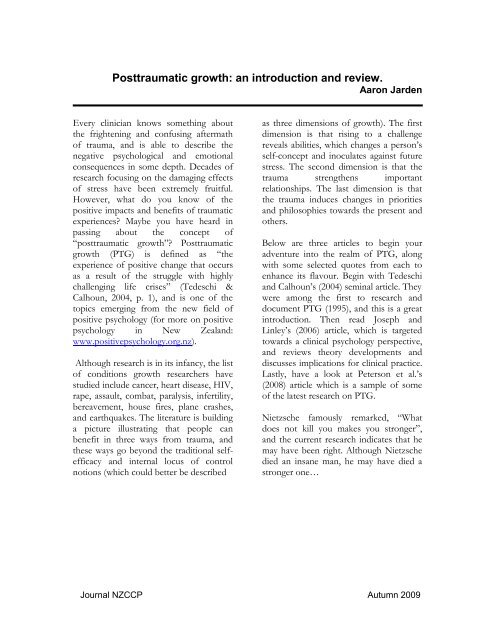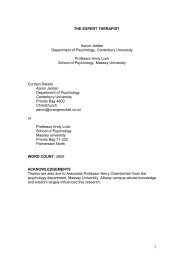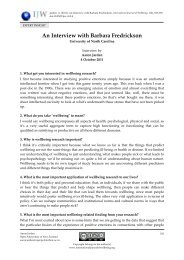Posttraumatic growth: an introduction and review. - Aaron Jarden
Posttraumatic growth: an introduction and review. - Aaron Jarden
Posttraumatic growth: an introduction and review. - Aaron Jarden
Create successful ePaper yourself
Turn your PDF publications into a flip-book with our unique Google optimized e-Paper software.
<strong>Posttraumatic</strong> <strong>growth</strong>: <strong>an</strong> <strong>introduction</strong> <strong>an</strong>d <strong>review</strong>.<br />
<strong>Aaron</strong> <strong>Jarden</strong><br />
Every clinici<strong>an</strong> knows something about<br />
the frightening <strong>an</strong>d confusing aftermath<br />
of trauma, <strong>an</strong>d is able to describe the<br />
negative psychological <strong>an</strong>d emotional<br />
consequences in some depth. Decades of<br />
research focusing on the damaging effects<br />
of stress have been extremely fruitful.<br />
However, what do you know of the<br />
positive impacts <strong>an</strong>d benefits of traumatic<br />
experiences? Maybe you have heard in<br />
passing about the concept of<br />
“posttraumatic <strong>growth</strong>”? <strong>Posttraumatic</strong><br />
<strong>growth</strong> (PTG) is defined as “the<br />
experience of positive ch<strong>an</strong>ge that occurs<br />
as a result of the struggle with highly<br />
challenging life crises” (Tedeschi &<br />
Calhoun, 2004, p. 1), <strong>an</strong>d is one of the<br />
topics emerging from the new field of<br />
positive psychology (for more on positive<br />
psychology in New Zeal<strong>an</strong>d:<br />
www.positivepsychology.org.nz).<br />
Although research is in its inf<strong>an</strong>cy, the list<br />
of conditions <strong>growth</strong> researchers have<br />
studied include c<strong>an</strong>cer, heart disease, HIV,<br />
rape, assault, combat, paralysis, infertility,<br />
bereavement, house fires, pl<strong>an</strong>e crashes,<br />
<strong>an</strong>d earthquakes. The literature is building<br />
a picture illustrating that people c<strong>an</strong><br />
benefit in three ways from trauma, <strong>an</strong>d<br />
these ways go beyond the traditional selfefficacy<br />
<strong>an</strong>d internal locus of control<br />
notions (which could better be described<br />
as three dimensions of <strong>growth</strong>). The first<br />
dimension is that rising to a challenge<br />
reveals abilities, which ch<strong>an</strong>ges a person’s<br />
self-concept <strong>an</strong>d inoculates against future<br />
stress. The second dimension is that the<br />
trauma strengthens import<strong>an</strong>t<br />
relationships. The last dimension is that<br />
the trauma induces ch<strong>an</strong>ges in priorities<br />
<strong>an</strong>d philosophies towards the present <strong>an</strong>d<br />
others.<br />
Below are three articles to begin your<br />
adventure into the realm of PTG, along<br />
with some selected quotes from each to<br />
enh<strong>an</strong>ce its flavour. Begin with Tedeschi<br />
<strong>an</strong>d Calhoun’s (2004) seminal article. They<br />
were among the first to research <strong>an</strong>d<br />
document PTG (1995), <strong>an</strong>d this is a great<br />
<strong>introduction</strong>. Then read Joseph <strong>an</strong>d<br />
Linley’s (2006) article, which is targeted<br />
towards a clinical psychology perspective,<br />
<strong>an</strong>d <strong>review</strong>s theory developments <strong>an</strong>d<br />
discusses implications for clinical practice.<br />
Lastly, have a look at Peterson et al.’s<br />
(2008) article which is a sample of some<br />
of the latest research on PTG.<br />
Nietzsche famously remarked, “What<br />
does not kill you makes you stronger”,<br />
<strong>an</strong>d the current research indicates that he<br />
may have been right. Although Nietzsche<br />
died <strong>an</strong> ins<strong>an</strong>e m<strong>an</strong>, he may have died a<br />
stronger one…<br />
Journal NZCCP Autumn 2009
Tedeschi, R. G., & Calhoun, L. G. (2004). <strong>Posttraumatic</strong> <strong>growth</strong>: Conceptual<br />
foundations <strong>an</strong>d empirical evidence. Psychological Inquiry, 15, 2004, 1-18.<br />
This article describes the concept of<br />
posttraumatic <strong>growth</strong>, its conceptual<br />
foundations, <strong>an</strong>d supporting empirical<br />
evidence. <strong>Posttraumatic</strong> <strong>growth</strong> is the<br />
experience of positive ch<strong>an</strong>ge that occurs<br />
as a result of the struggle with highly<br />
challenging life crises. It is m<strong>an</strong>ifested in a<br />
variety of ways, including <strong>an</strong> increased<br />
appreciation for life in general, more<br />
me<strong>an</strong>ingful interpersonal relationships, <strong>an</strong><br />
increased sense of personal strength,<br />
ch<strong>an</strong>ged priorities, <strong>an</strong>d a richer existential<br />
<strong>an</strong>d spiritual life. Although the term is<br />
new, the idea that great good c<strong>an</strong> come<br />
from great suffering is <strong>an</strong>cient. We<br />
propose a model for underst<strong>an</strong>ding the<br />
process of posttraumatic <strong>growth</strong> in which<br />
individual characteristics, support <strong>an</strong>d<br />
disclosure, <strong>an</strong>d more centrally, signific<strong>an</strong>t<br />
cognitive processing involving cognitive<br />
structures threatened or nullified by the<br />
traumatic events, play <strong>an</strong> import<strong>an</strong>t role.<br />
It is also suggested that posttraumatic<br />
<strong>growth</strong> mutually interacts with life<br />
wisdom <strong>an</strong>d the development of the life<br />
narrative, <strong>an</strong>d that it is <strong>an</strong> ongoing<br />
process, not a static outcome.<br />
1. “…we have been finding that<br />
reports of <strong>growth</strong> experiences in<br />
the aftermath of traumatic events<br />
far outnumber reports of<br />
psychiatric disorders” (page 2).<br />
2. “The widespread assumptions that<br />
traumas often result in disorder<br />
should not be replaced with<br />
expectations that <strong>growth</strong> is <strong>an</strong><br />
inevitable result. Instead, we are<br />
finding that continuing personal<br />
distress <strong>an</strong>d <strong>growth</strong> often coexist”<br />
(page 2).<br />
3. “The evidence is overwhelming<br />
that individuals facing a wide<br />
variety of very difficult<br />
circumst<strong>an</strong>ces experience<br />
signific<strong>an</strong>t ch<strong>an</strong>ges in their lives<br />
that they view as highly positive.<br />
Although much progress has been<br />
made recently, little is known<br />
about the processes,<br />
concomit<strong>an</strong>ts, <strong>an</strong>d consequences<br />
of the experience of <strong>growth</strong>”<br />
(page 3).<br />
4. “<strong>Posttraumatic</strong> <strong>growth</strong> is not<br />
simply a return to baseline – it is<br />
<strong>an</strong> experience of improvement<br />
that for some persons is deeply<br />
profound” (page 4).<br />
5. “<strong>Posttraumatic</strong> <strong>growth</strong>, then, has a<br />
quality of tr<strong>an</strong>sformation, or a<br />
qualitative ch<strong>an</strong>ge in functioning,<br />
unlike the apparently similar<br />
concepts of resilience, sense of<br />
coherence, optimism, <strong>an</strong>d<br />
hardiness” (page 4).<br />
6. “…posttraumatic <strong>growth</strong> implies<br />
<strong>an</strong> established set of schemas that<br />
are ch<strong>an</strong>ged in the wake of<br />
trauma” (page 4).<br />
7. “Growth, however, does not<br />
occur as a direct result of trauma.<br />
It is the individual’s struggle with<br />
the new reality in the aftermath of<br />
trauma that is crucial in<br />
determining the extent to which<br />
posttraumatic <strong>growth</strong> occurs”<br />
(page 5).<br />
8. “We have noticed that<br />
posttraumatic <strong>growth</strong> tends to<br />
surprise people, <strong>an</strong>d has not<br />
usually been a conscious goal”<br />
(page 15).<br />
Journal NZCCP Autumn 2009
Joseph, S., & Linley, P. A. (2006). Growth following adversity: Theoretical<br />
perspectives <strong>an</strong>d implications for clinical practice. Clinical Psychology<br />
Review, 26, 1041-1053.<br />
A number of literatures <strong>an</strong>d philosophies<br />
throughout hum<strong>an</strong> history have conveyed<br />
the idea that there is personal gain to be<br />
found in suffering, <strong>an</strong>d it is <strong>an</strong> idea central<br />
to the existential-hum<strong>an</strong>istic tradition of<br />
psychology. However, it is only relatively<br />
recently that the topic of <strong>growth</strong> following<br />
adversity has become the focus for<br />
empirical <strong>an</strong>d theoretical work. In this<br />
paper, we <strong>review</strong> theoretical models of<br />
<strong>growth</strong>, <strong>an</strong>d discuss the implications of<br />
<strong>growth</strong> for clinical practice. Three main<br />
theoretical perspectives are <strong>review</strong>ed, the<br />
functional-descriptive model, the metatheoretical<br />
person-centered perspective,<br />
<strong>an</strong>d the biopsychosocial-evolutionary<br />
view. It is proposed that these three<br />
approaches to theory offer different but<br />
complementary levels of <strong>an</strong>alysis, <strong>an</strong>d that<br />
theoretical integration between them is<br />
possible. We then go on to explore the<br />
implications of this theoretical integration<br />
for clinical practice, <strong>an</strong>d conclude with a<br />
consideration of the role of therapy in<br />
facilitating <strong>growth</strong> following adversity.<br />
1. “It is now well established that<br />
stressful <strong>an</strong>d traumatic events may<br />
serve as a trigger towards personal<br />
<strong>growth</strong> <strong>an</strong>d positive ch<strong>an</strong>ge” (page<br />
1041).<br />
2. “…there is as yet little<br />
psychometric research evidence<br />
on the structure of <strong>growth</strong>” (page<br />
1042).<br />
3. “…the evidence is now<br />
overwhelmingly supportive that<br />
<strong>growth</strong> often occurs in people<br />
following trauma <strong>an</strong>d adversity”<br />
(page 1042).<br />
4. “Research has also begun to<br />
document the correlates <strong>an</strong>d<br />
predictors of <strong>growth</strong>, with<br />
evidence pointing to the<br />
import<strong>an</strong>ce of stress-appraisal,<br />
coping <strong>an</strong>d personality variables,<br />
with more extravert, optimistic,<br />
<strong>an</strong>d self-efficacious people, who<br />
use spiritual, <strong>an</strong>d emotionally<br />
focused coping being more likely<br />
to experience <strong>growth</strong>. Social<br />
support is import<strong>an</strong>t too” (page<br />
1042).<br />
5. “Interest in <strong>growth</strong> c<strong>an</strong> be seen as<br />
part of the wider positive<br />
psychology movement” (page<br />
1047).<br />
6. “…the study of <strong>growth</strong> promises<br />
to have import<strong>an</strong>t applications for<br />
practicing psychologists” (page<br />
1047).<br />
7. “…the focus should be on<br />
assisting the patient to develop the<br />
metacognitive reconfiguration of<br />
schema needed to turn <strong>an</strong>xiety<br />
into me<strong>an</strong>ing” (page 1047).<br />
8. “Given that research remains in its<br />
inf<strong>an</strong>cy, it is too early to be certain<br />
what the exact therapeutic<br />
implications of <strong>growth</strong> will be, <strong>an</strong>d<br />
how best to facilitate <strong>growth</strong>, but<br />
the fact that the facilitation of<br />
<strong>growth</strong> becomes the goal of<br />
therapeutic intervention rather<br />
th<strong>an</strong> the alleviation of distress is in<br />
itself a major paradigm shift in the<br />
field” (page 1047).<br />
9. “…<strong>growth</strong> following adversity<br />
does seem to be predictive of<br />
better emotional adjustment in the<br />
longer term” (page 1047).<br />
10. “…naturalistic evidence points<br />
toward the conclusion that helping<br />
people perceive <strong>growth</strong> c<strong>an</strong><br />
therefore be a useful therapeutic<br />
vehicle to help people cope with<br />
adversity <strong>an</strong>d illness” (page 1048).<br />
11. “The main clinical implication is<br />
the assertion that what we know<br />
Journal NZCCP Autumn 2009
about the alleviation of posttraumatic<br />
stress does not<br />
necessarily apply to facilitating<br />
<strong>growth</strong> Indeed, it is possible that<br />
some existing approaches to<br />
alleviating post-traumatic stress<br />
serve to thwart <strong>growth</strong>-related<br />
processes” (page 1050).<br />
Peterson, C., Park, N., Pole, N., D'Andrea, W., & Seligm<strong>an</strong>, M. E. P. (2008).<br />
Strengths of character <strong>an</strong>d posttraumatic <strong>growth</strong>. Journal of Traumatic Stress,<br />
21, 214-217.<br />
How are strengths of character related to<br />
<strong>growth</strong> following trauma? A retrospective<br />
Web-based study of 1,739 adults found<br />
small, but positive associations among the<br />
number of potentially traumatic events<br />
experienced <strong>an</strong>d a number of cognitive<br />
<strong>an</strong>d interpersonal character strengths. It<br />
was concluded that <strong>growth</strong> following<br />
trauma may entail the strengthening of<br />
character.<br />
1. “…positive psychological ch<strong>an</strong>ges<br />
c<strong>an</strong> occur following a potentially<br />
traumatic event as post- traumatic<br />
<strong>growth</strong>: improved relationships with<br />
others, openness to new<br />
possibilities, greater appreciation<br />
of life, enh<strong>an</strong>ced personal<br />
strength, <strong>an</strong>d spiritual<br />
development” (page 214).<br />
2. “Post traumatic <strong>growth</strong>…remains<br />
controversial because of<br />
measurement challenges” (page<br />
214).<br />
3. “…these findings are import<strong>an</strong>t<br />
given how m<strong>an</strong>y theories<br />
emphasise the psychologically<br />
scarring effects of such events.<br />
That <strong>an</strong>y character benefits at all<br />
are associated with increasing<br />
exposure to potential trauma adds<br />
to a growing literature showing<br />
that people are more resilient th<strong>an</strong><br />
ext<strong>an</strong>t theories predict” (page<br />
216).<br />
For further <strong>review</strong>s of PTG, see: Nolen-<br />
Hoeksema & Davis (2002), Tedeschi,<br />
Park, & Calhoun (1998), Tennen &<br />
Affleck (1998), <strong>an</strong>d Updegraff & Taylor<br />
(2000). A great text with which to begin<br />
more detailed learning is: Joseph, S., &<br />
Linley, P. A. (Eds.). (2008). Trauma, recovery<br />
<strong>an</strong>d <strong>growth</strong>: Positive psychological perspectives on<br />
posttraumatic stress. New Jersey: Wiley.<br />
References<br />
Nolen-Hoeksema, S., & Davis, C. G.<br />
(2002). Positive responses to <strong>growth</strong>:<br />
Perceiving benefits <strong>an</strong>d <strong>growth</strong>. In C. R.<br />
Snyder <strong>an</strong>d S. J. Lopez (Eds.), H<strong>an</strong>dbook<br />
of positive psychology. (pp. 598-607). New<br />
York: Oxford University Press.<br />
Tedechi, R. G., Park, Cl. L., & Calhoun, L. G.<br />
(Eds.). (1998). Post-traumatic <strong>growth</strong>: Positive<br />
ch<strong>an</strong>ges in the aftermath of crisis. Mahwah,<br />
NJ: Lawrence Erlbaum.<br />
Tennen, H., & Affleck, G. (1998). Personality <strong>an</strong>d<br />
tr<strong>an</strong>sformation in the face of adversity. In<br />
R.G. Tedeshci, C.L. Park, & L.G.<br />
Calhoun (Eds.), <strong>Posttraumatic</strong> <strong>growth</strong>:<br />
Positive ch<strong>an</strong>ges in the aftermath of crisis (pp.<br />
65-98). Mahwah, NJ: Lawrence Erlbaum<br />
Associates.<br />
Updegraff, J. A., & Taylor, S. E. (2000). From<br />
vulnerability to <strong>growth</strong>: Positive <strong>an</strong>d<br />
negative effects of stressful life events. In<br />
J. H. Harvey & E. Miller (Eds.), Loss <strong>an</strong>d<br />
trauma: General <strong>an</strong>d close relationship<br />
perspectives (pp. 3-28). Philadelphia:<br />
Brunner-Routledge<br />
Note: New Zeal<strong>an</strong>d is currently hosting<br />
one of the largest international<br />
longitudinal studies on PTG - see The<br />
Wellbeing<br />
Study<br />
(www.wellbeingstudy.com).<br />
<strong>Aaron</strong> <strong>Jarden</strong> is a lecturer in psychology at the Open Polytechnic of New Zeal<strong>an</strong>d <strong>an</strong>d president of the New Zeal<strong>an</strong>d<br />
Association of Positive Psychology aaron.jarden@openpolytechnic.ac.nz<br />
Journal NZCCP Autumn 2009





